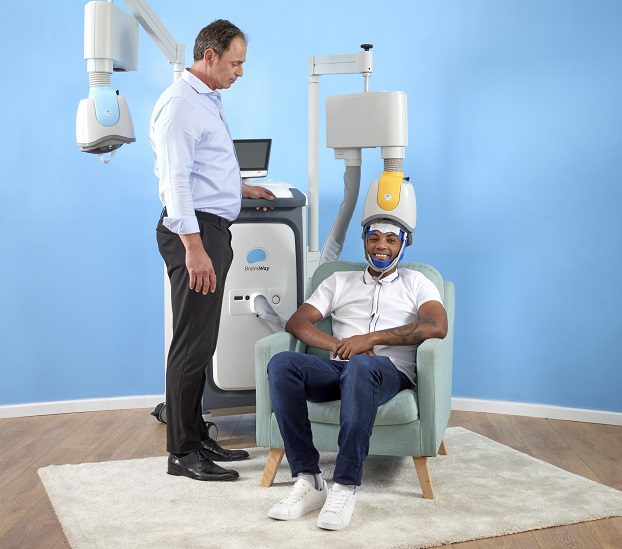Transcranial Magnetic Stimulation, or TMS, is a noninvasive treatment that utilizes repeated magnetic pulses to safely and effectively regulate neural activity related to various mental health conditions. Due to the repeated nature of the treatment, TMS is sometimes referred to as repetitive TMS, or rTMS.
There are currently two kinds of TMS publicly available as a form of therapy: the earlier, standard rTMS; and the more advanced Deep TMS. While they share certain similarities, each holds its own unique attributes, with standard rTMS being the first on the market, and Deep TMS being the only noninvasive therapy FDA-cleared to treat Obsessive-Compulsive Disorder (OCD).
Standard and Deep TMS activate a series of magnetic pulses that safely reaches brain structures shown to be related to a number of mental health conditions. The repeated magnetic pulses they use influence and regulate these brain structures’ neural activity—with Deep TMS managing to directly stimulate deeper structures—thereby reducing adverse symptoms of mental health conditions.
Both standard TMS and Deep TMS have been shown to be safe, noninvasive forms of therapy. In a 2007 randomized controlled study published by Clinical Neurophysiology, the safety of Deep TMS was compared to both the standard TMS treatment and a sham group. The results showed that just like the sham and standard TMS groups, Deep TMS is well tolerated, with no adverse physical or neurological outcomes.
Additionally, both standard and Deep TMS were found to effectively offer greater relief to individuals battling mental health issues. A 2019 study on Major Depressive Disorder (MDD), published in the Journal of Psychiatric Research, elaborates on this point: when examined across all MDD levels of severity, the study found that both standard and Deep TMS treatments resulted in significantly higher remission rates when combined with pharmacotherapy, as opposed to pharmacotherapy alone. Response rates, however, were found to be significantly higher for Deep TMS and pharmacotherapy than both standard rTMS and pharmacotherapy, and pharmacotherapy alone.

Standard rTMS and Deep TMS differ on a number of levels, including their FDA clearance status, the scope of influence, and treatment effectiveness.
Standard TMS received FDA clearance to treat MDD in 2008, and to treat certain migraine headaches in 2013. Deep TMS received an FDA clearance status for treating MDD in 2013, and for treating OCD in 2018. BrainsWay is currently working to expand Deep TMS’s clearance status in treating additional conditions.
In addition to receiving a clearance status from the US’s FDA, Deep TMS has received the European CE certification mark for several other conditions, indicating that dTMS was found to conform to the safety, health and environmental standards of products sold within the European Economic Area (EEA).
Deep TMS has received the European CE mark due to its proven ability to alleviate the symptoms of a wide range of mental health conditions. These include MDD, OCD, Alzheimer’s Disease (AD), Autism, Bipolar Disorder, Chronic Pain, Multiple Sclerosis (MS), Parkinson’s Disease, post-stroke rehabilitation, Posttraumatic Stress Disorder (PTSD), the negative symptoms of Schizophrenia, and smoking cessation.
Standard rTMS uses a figure-8 coil, while Deep TMS uses a patented H-coil held inside a padded helmet. While the magnetic pulses activated by standard rTMS only reach a depth of 0.27” (0.7cm), Deep TMS’s technology manages to reach a significant sub-threshold of 1.25” (3.2cm). This as shown in a Brain Stimulation study from 2014. Deep TMS also utilizes a significantly wider field of stimulation compared to that of standard rTMS.
Additionally, since magnetic stimulation caused by standard rTMS is more focal, its pulses are directed at a specific point in the brain, as opposed to the broader stimulation of Deep TMS. Because clinical efficacy relies on activating the correct brain structures, standard rTMS often suffers from targeting issues, resulting in reduced efficacy. While this can be mitigated by pairing standard rTMS with complex and costly neuronavigation equipment, Deep TMS does not require any such equipment.
According to recent studies, Deep TMS’s ability to safely and directly stimulate both deeper and wider ranges of the brain may be crucial in successfully treating mental health conditions, such as MDD. This is due to the fact that several structures are at times involved in the symptoms caused by these conditions, and since the exact location of these structures can greatly vary between individuals.
Due to the two treatments’ use of different equipment, as well as their reliance on different depths and widths of direct stimulation, standard and Deep TMS have been shown to cause different levels of effectiveness in treating a variety of patients and symptoms. Specifically, a 2019 study published in the Journal of Psychiatric Research showed that patients with moderate-to-severe baseline depression achieved significantly higher response rates when treated with Deep TMS and medication, as opposed to standard rTMS and medication, or medication alone.
Deep TMS’s efficacy was also highlighted by the FDA, which found it to be the only noninvasive treatment on the market to significantly alleviate symptoms of OCD.
As more and more research reaffirms Deep TMS’s safety, efficacy and impact on the world of mental health, BrainsWay continues to grow in influence and number of partnerships, providing greater quality of life around the globe.